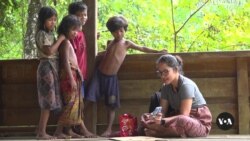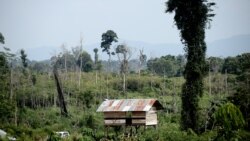ປ່າສະຫງວນແຫ່ງຊາດ ບູກິດ ດົວເບລາສ (Bukit Duabelas) ເທິງເກາະຊູມາດຕຣາ ເປັນບ່ອນຢູ່ອາໄສຂອງຊົນເຜົ່າ ອໍຣັງ ຣິມບາ, ຫຼື “ຄົນປ່າ” ເຊິ່ງເປັນນຶ່ງໃນຫຼາຍຮ້ອຍຊົນເຜົ່າພື້ນເມືອງຂອງອິນໂດເນເຊຍ.
ນາງ ໂຢຮານາ ມາພາອູງ (Yohana Marpaung), ຜູ້ອໍານວຍຄວາມສະດວກດ້ານການສຶກສາສໍາລັບສາຂາ ວາສີ (Warsi) ຂອງການອະນຸລັກຊຸມຊົນອິນໂດເນເຊຍ — ຫຼື KKI Warsi. ກຸ່ມດັ່ງກ່າວ ເຮັດວຽກກ່ຽວກັບການອະນຸລັກຮັກສາປ່າໄມ້ ແລະ ສົ່ງເສີມຊຸມຊົນທີ່ອາໄສຢູ່ໃນ ແລະອ້ອມຂ້າງບັນດາປ່າໄມ້ດັ່ງກ່າວ.
ນາງເວົ້າວ່າ KKI-Warsi ສອນທັກສະພື້ນຖານໃຫ້ແກ່ພວກຊົນເຜົ່າ ອໍຣັງ ຣິມບາ ເຊັ່ນວ່າ ການອ່ານ ແລະຄິດໄລ່ເລກ, ແຕ່ບໍ່ແມ່ນຢູ່ໃນຫ້ອງຮຽນແບບດັ້ງເດີມ.
ນາງ ໂຢຮານາ ມາພາອູງ (Yohana Marpaung), ກ່າວເປັນພາສາອິນໂດເນເຊຍວ່າ:
"ພວກເຮົາສອນພວກເຂົາ ເວລາໃດກໍໄດ້ທີ່ພວກເຂົາຕ້ອງການ ແລະ ບ່ອນໃດທີ່ພວກເຂົາຢູ່."
ທັງນີ້ແມ່ນເນື່ອງຈາກວ່າ ຊາວອໍຣັງ ຣິມບາ ເປັນຊົນເຜົ່າທີ່ຍ້າຍບ່ອນຢູ່ເປັນປະຈຳ.
ນາງ ໂຢຮານາ ມາພາອູງ (Yohana Marpaung) ໄດ້ພາ VOA ໄປເບິ່ງສະຖານທີ່ ທີ່ ຊາວອໍຣັງ ຣິມບາ ອາໄສຢູ່, ແລະ ໄດ້ກ່າວຕໍ່ວີໂອເອ ເປັນພາສາອິນໂດເນເຊຍວ່າ:
“ນີ້ແມ່ນເຮືອນແບບທົ່ວໄປຂອງ ອໍຣັງ ຣິມບາ ຢູ່ໃນປ່າ. ປັດຈຸບັນ, ເຮືອນໄດ້ຖືກປະຮ້າງ, ເພາະຕອນນີ້ເປັນລະດູໝາກຖົ່ວລຽນ, ພວກເຂົາເຈົ້າຈຶ່ງ ຍ້າຍເຂົ້າໄປໃນປ່າເພື່ອໄປເກັບໝາກໄມ້ຈາກຜື້ນປ່າ.”
ໃນຂະນະທີ່ ວັດທະນະທຳ ແລະຮີດຄອງປະເພນີບາງຢ່າງ ຂອງພວກເຂົາ ປົກປ້ອງພວກເຂົາຈາກອິດທິພົນພາຍນອກ, ຊາວອໍຣັງ ຣິມບາ ກໍບໍ່ໄດ້ຖືກແຍກອອກຈາກປະຊາກອນທົ່ວໄປ ໂດຍສິ້ນເຊີງ.
ຍົກຕົວຢ່າງ, ການປ່ຽນປ່າຂອງເກາະສຸມາດຕຣາເປັນສວນປາມ, ໄດ້ຜັກດັນພວກເຂົາອອກຈາກເນື້ອທີ່ດິນ, ເຊິ່ງໄດ້ບີບບັງຄັບໃຫ້ພວກເຂົາຕ້ອງພົວພັນກັບໂລກພາຍນອກຫຼາຍຂຶ້ນ. ນັ້ນແມ່ນເຫດຜົນທີ່ KKI Warsi ໄດ້ເລີ່ມຕົ້ນຊ່ວຍເຫຼືອ ແລະສະຫນັບສະຫນູນ ຊາວອໍຣັງ ຣິມບາ ໃນປີ 1998.
ນາງ ຊຸກມາ ເຣນີ (Sukma Reni) ກໍຢູ່ໃນ KKI Warsi ເຊັ່ນກັນ ກ່າວວ່າອົງການຈັດຕັ້ງ ສະຫນອງການສຶກສາທີ່ຈຳເປັນໃຫ້ແກ່ ຊາວ ອໍຣັງ ຣິມບາ ໃນການປັບຕົວໃຫ້ເຂົ້າກັບການປ່ຽນແປງ. ນາງກ່າວວ່າ ສິ່ງທີ່ສຳຄັນທີ່ສຸດແມ່ນການສອນພວກເຂົາໃຫ້ອ່ານ.
"ສິ່ງທີ່ພວກເຮົາມອບໃຫ້ແມ່ນການສຶກສາທີ່ຈຳເປັນ, ວິທີການຢູ່ລອດ, ວິທີການປັບຕົວໃຫ້ເຂົ້າກັບການປ່ຽນແປງທີ່ຢູ່ອ້ອມຂ້າງພວກເຂົາ. ພວກເຮົາຕ້ອງການໃຫ້ພວກເຂົາເຂົ້າໃຈວ່າມີໂລກພາຍນອກ, ແລະສິ່ງທີ່ສໍາຄັນແມ່ນການສອນໃຫ້ພວກເຂົາອ່ານໜັງສື.”
ການກືກໜັງສືໄດ້ພິສູດໃຫ້ເຫັນວ່າ ເປັນຂໍ້ເສຍປຽບຂອງ ຊາວອໍຣັງ ຣິມບາ ໃນລະຫວ່າງການເລືອກຕັ້ງຂອງອິນໂດເນເຊຍ ໃນຊ່ວງກາງເດືອນກຸມພາ. ພວກເຂົາເຈົ້າໄດ້ສະແດງຕົວຢູ່ໜ່ວຍປ່ອນບັດເລືອກຕັ້ງຕາມຄຳແນະນຳ, ແຕ່ມີພຽງບໍ່ເທົ່າໃດຄົນທີ່ຮູ້ຈັກຜູ້ສະໝັກ, ຫລື ຖ້າພວກເຂົາເຈົ້າຮູ້, ພວກເຂົາເຈົ້າກໍບໍ່ຮູ້ວິທີຊອກຫາຊື່ຂອງພວກເຂົາ ໃນລາຍຊື່ຜູ້ມີສິດປ່ອນບັດເລືອກຕັ້ງ. ຊາວ ອໍຣົງ ຣິມບາ ໂດຍທົ່ວໄປ ຈະໃຊ້ຊື່ດຽວ ກໍໄດ້ໂອ້ລົມກັບ VOA ກ່ຽວກັບປະສົບການນີ້.
ທ້າວ ເມີຣີອາວ (Meriau), ຜູ້ຊາຍຊາວ ອໍຣັງ ຣິມບາ ເວົ້າເປັນພາສາ ອໍຣັງ ຣິມບາ ວ່າ:
“ຂ້ອຍມາທີ່ນີ້ເພື່ອລົງຄະແນນສຽງ. ຂ້ອຍລົງຄະແນນສຽງເລືອກຕັ້ງປະທານາທິບໍດີ ແລະເຈົ້າໜ້າທີ່ທ້ອງຖິ່ນນຳອີກດ້ວຍ.”
ນາງ ເຊລິເຊ (Selise), ແມ່ຍິງຊາວ ອໍຣົງ ຣິມບາ ເວົ້າເປັນພາສາ ອໍຣັງ ຣິມບາ ວ່າ:
"ຂ້ອຍບໍ່ຮູ້ວ່າ ຈະເລືອກໃຜ. ມັນບໍ່ຈະແຈ້ງເລີຍອີກດ້ວຍ.”
ຊາວ ອໍຣັງ ຣິມບາ ຈຳນວນຫຼາຍ ໄດ້ຖືກນຳພາເຂົ້າໄປຫາຕູ້ລົງຄະແນນສຽງໂດຍຍາດພີ່ນ້ອງທີ່ສາມາດອ່ານ ແລະຂຽນໜັງສືໄດ້. ຜູ້ສະຫນັບສະຫນູນຄື ທ້າວ ເຣມີ (Remi) ກ່າວວ່າ ມີການໃຊ້ຄວາມພະຍາຍາມພຽງເລັກນ້ອຍເພື່ອເຮັດໃຫ້ຊາວ ອໍຣັງ ຣິມບາ ເຂົ້າໃຈວ່າ ຍ້ອນຫຍັງການເລືອກຕັ້ງຈຶ່ງມີຄວາມສໍາຄັນສໍາລັບພວກເຂົາ.
ນາງ ຊຸກມາ ເຣນີ (Sukma Reni), ຈາກກຸ່ມ KKI Warsi ກ່າວເປັນພາສາອິນໂດເນເຊຍວ່າ:
“ພວກເຂົາບໍ່ເຂົ້າໃຈ. ພວກເຂົາພຽງແຕ່ມາທີ່ນີ້ ເພື່ອການເລືອກຕັ້ງ ເພາະວ່າພວກເຂົາໄດ້ຖືກເຊື້ອເຊີນ.”
ຊາວອໍຣັງ ຣິມບາ ບາງຄົນ ຫວັງວ່າ ລັດຖະບານທີ່ພວກເຂົາເຈົ້າໄດ້ຊ່ວຍເລືອກຈະໃຫ້ຄວາມສົນໃຈພວກເຂົາເຈົ້າ.
ທ້າວ ເມີລູຣິງ (Meluring), ຜູ້ຊາຍຊາວອໍຣັງ ຣິມບາ ໄດ້ກ່າວເປັນພາສາອິນໂດເນເຊຍວ່າ:
"ຂ້ອຍ ແລະສະມາຊິກຄົນອື່ນໆຂອງຊົນເຜົ່າຂ້ອຍ ຫວັງວ່າ ເມື່ອປະທານາທິບໍດີ ໄດ້ຖືກເລືອກແລ້ວ, ທ່ານຈະສາມາດມາຢ້ຽມຢາມ ແລະພົບກັບພວກເຮົາໄດ້ໂດຍກົງ, ເພື່ອມາເບິ່ງວ່າ ພວກເຮົາດໍາລົງຊີວິດແນວໃດ."
ມີຊາວອໍຣັງ ຣິມບາ ປະມານ 4,000 ຄົນອາໄສຢູ່ໃນປ່າທາງພາກຕາເວັນອອກຂອງເກາະຊູມາດຕຣາ, ແຜ່ຂະຫຍາຍອອກໄປຢູ່ພາຍໃນສອງປ່າສະຫງວນແຫ່ງຊາດນີ້.
ອ່ານລາຍງານເປັນພາສາອັງກິດຂ້າງລຸ່ມນີ້:
Agriculture and industrial farming often conflict with Indigenous communities in Indonesia, a country with hundreds of ethnic groups. VOA’s Ahadian Utama met with the Orang Rimba [[pron: Oh-Rung Reem-Ba]] people of Sumatra and has this report.
The forests of Bukit Duabelas National Park on the island of Sumatra are home to the Orang Rimba, or "forest people," just one of the hundreds of Indigenous tribes of Indonesia.
Yohana Marpaung is an education facilitator for the Warsi branch of the Indonesian Conservation Community — or KKI Warsi. The group work on preserving forests and advocating for communities who live in and around them.
She says KKI-Warsi teaches Orang Rimba people basic skills like reading and mathematics, but not in a traditional classroom.
Yohana Marpaung, KKI Warsi Education Facilitator said:
“We teach them whenever they want, wherever they are.”
This is because the Orang Rimba are nomadic.
Yohana Marpaung showed VOA where the Orang Rimba live.
Yohana Marpaung, KKI Warsi Education Facilitator told VOA:
“This is a typical Orang Rimba home in the forest. Right now, the house has been abandoned because it’s currently durian [dur-ee-unh] season, and they move farther into the forests to pick up the fruit from the forest floor.”
While some of their customs and traditions shield them from outside influences, the Orang Rimba are not completely isolated from the general population.
The conversion of Sumatra’s forests into palm oil plantations, for example, has pushed them off their land, forcing them to interact more frequently with the outside world. That's why KKI Warsi began assisting and advocating for the Orang Rimba in 1998.
Sukma Reni, also with KKI Warsi, say organization provides the Orang Rimba with critical education in adapting to changes. What’s most important, she says, is teaching them to read.
Sukma Reni, KKI Warsi said:
“What we provide is critical education, on how to survive, on how to adapt to the changes around them. We want them to understand there’s a world outside, and what’s important is teaching them to read.”
The lack of literacy proved to be a disadvantage for the Orang Rimba during the Indonesian elections in mid-February. They showed up at the polls as instructed, but very few even knew the candidates, or if they did, they wouldn’t know how to find their name on a ballot. Orang Rimba individuals – who typically go by one name - spoke to VOA about the experience.
Meriau, Orang Rimba, said:
“I come here to vote. I vote for president and also for local officials.”
Selise, Orang Rimba, said:
“I don’t know who to choose. It’s all so unclear.”
Many Orang Rimba were accompanied into the voting booth by relatives who could read and write. Advocates like Remi say little effort has been made to help the Orang Rimba understand why elections are important for them.
Sukma Reni, KKI Warsi said:
“They don’t understand. They only come here for elections because they have been invited.”
Some Orang Rimba hope that the government they’ve helped choose will pay attention to them.
Meluring, Orang Rimba said:
“I and other members of my tribe hope that once the president is elected, he can come visit and meet with us directly, to see how we live.”
There are about 4 thousand Orang Rimba in the forests of eastern Sumatra, spread among two national parks.







ຟໍຣັມສະແດງຄວາມຄິດເຫັນ